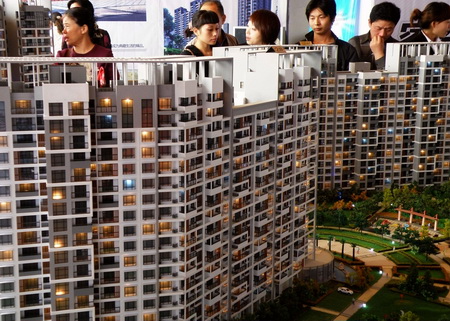Real Estate
- Details
- By David Cao
- Hits: 1560
Residential land prices in 35 major Chinese cities grew 8.63 percent on average in 2009, a Ministry of Land and Resources report published Friday said.
Land prices for commercial buildings grew at a slower rate, 5.54 percent, while industrial land prices rose 2.04 percent.
The report's release comes after land plots in major Chinese cities sold for record prices at auction, adding to concern that increased land prices have driven up housing prices.
The ministry said in March residential property prices rose an average 25.1 percent from a year ago to 4,474 yuan ($655.6) per square meter nationwide last year.
The report also said land sales climbed 63.4 percent from a year earlier to 1.59 trillion yuan in 2009.
Land supply for construction increased 44.2 percent year on year to 319,000 hectares in 2009 as the government accelerated infrastructure and property construction to boost domestic demand and ensure economic growth, the report said.
- Details
- By David Cao
- Hits: 1814

China city - Ordos spend 5 billion RMB/CNY (about 732 460 000 Dollars) in 5years to built an uninhabited district for the purpose of showing the high-speed development. In the end, it become the ironic sample of China's gaint real estate bubble.
- Details
- By David Cao
- Hits: 1699
The land price record for residential housing in Beijing was broken twice on Monday.
After 64 bidding rounds, a plot of residential land in Daxing district in South Beijing was sold for 5.25 billion yuan ($769 million), setting a new sales record for Beijing's housing market.
A real estate company, belonging to the Citic Group bought the 185,861 sq m plot of land for 17,000 yuan per sq m.
Earlier that day, a plot of residential land located at Dawangjingcun village in Chaoyang district was sold for 4.08 billion yuan to another real-estate developer, Sino-Ocean, according to information from the Beijing Land Coordination and Reserve Center.
The average price of land in the sale was 27,000 yuan per sq m, the highest in history.

Read more: Land price record broken by China state-own company twice in day
- Details
- By Mengxin
- Hits: 1857
Brokerages increasingly optimistic about sector they say is undervalued
UBS AG and JPMorgan Chase & Co turned positive on Chinese property stocks, saying the plunge in share prices this year has made them cheap and concern over tighter credit has been overstated.
"Concerns over policy tightening have impacted sector performance recently, while the sector's valuation has largely been ignored," wrote Zhang Haiyun, a Shanghai-based analyst at UBS, said in a report on Tuesday. UBS, Switzerland's largest bank by assets, upgraded its view on the industry to "positive" from "neutral".

Potential buyers look at a model of a property project at a housing fair in Yichang, Hubei province.
- Details
- By Mengxin
- Hits: 1548
The dragon-shaped Pangu Plaza, which overlooks Olympic Green and is next to the iconic Bird's Nest Stadium, has been fined an undisclosed sum for its luxury rooftop courtyard houses after city authorities ruled it had made "illegal constructions".
|

|
The 192-m tall Pangu Plaza was designed by world renowned architect Li Zuyuan, who is responsible for the Taipei 101 tower.
Li built 12 courtyard houses on the roof of three buildings that covered a total area of 11,298 sq m.
The courtyard houses have been so sought-after that some Chinese tabloids even claimed billionaire Bill Gates rented one for 100 million yuan a year ahead of the 2008 Beijing Olympics.
"It is really gorgeous, as if I can touch the sky," Chen Le, a businessman, recalled after standing in a Pangu courtyard in 2008. "The decoration was quite luxurious, with a strong traditional Chinese flavor. When I was there, a tenant was hiring people to place precious orchids there."
But Beijing municipal commission of urban planning posted an announcement on its website recently saying the courtyards violated planning laws and noting that the building's investor, Pangu Investment Limited, would be fined.
"Our company received the notice in early 2009 and we have already paid the fine," Yang Rui, marketing manager at Pangu Investment Limited, told METRO yesterday.
"As long as we finish all the procedures and the Beijing authority has accepted our fine, the courtyard houses have the right to continue to exist," Yang added.
"They (the Beijing municipal commission of urban planning) did not ask us to destroy them, just pay a sum of money."
Yang would not reveal how much money changed hands but, according to Beijing's urban planning rules, "illegal constructions" can be fined up to 3,000 yuan per sq m.
"When we planned to construct these courtyards, we submitted documents on the design change to the commission at the same time. If the design change is not approved by the authority, it is a violation. But now, it is not," Yang said.
The 12 courtyard houses are only for rent, not for sale. Local media has reported they rent for as much as a million yuan a day, or 100 million yuan a year.
Yang said that price was not correct.
He said sales in the building have been brisk.
In addition to Pangu Plaza, 12 other Beijing property developers have been fined for making illegal constructions.
More Articles …
Page 12 of 19